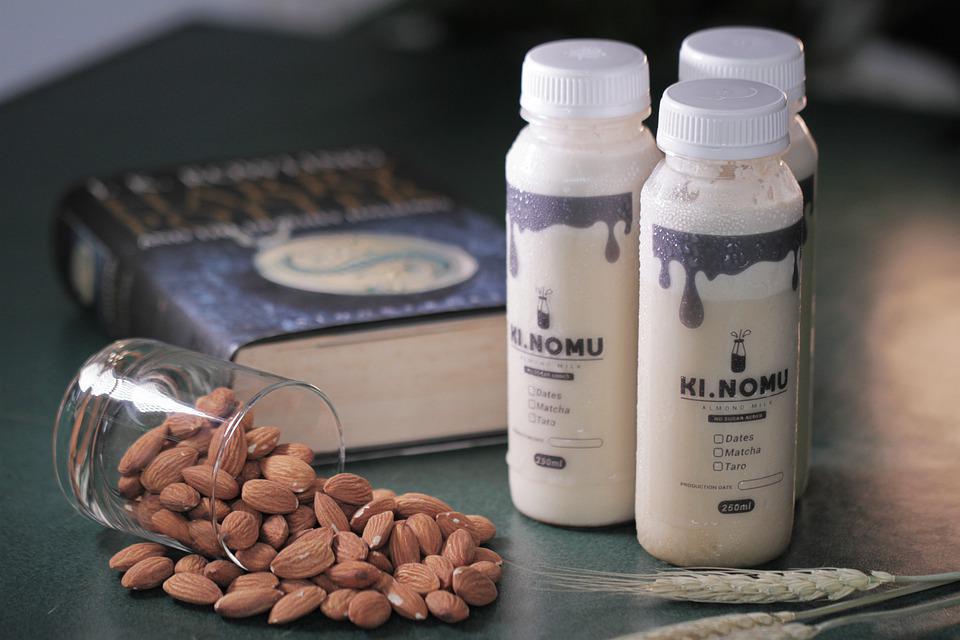If you’re wondering why you shouldn’t drink almond milk, keep reading! In this article, we’ll discuss why almond milk is not a good idea, what it does to our health, and whether it can cause cancer. Also, we’ll look at the fact that almond milk contains less protein than cow’s milk and is a iatrogenic food. So, what should you do? Let’s begin by answering those questions! The benefits of eating a plant-based diet, including switching to plant-based milk like almond milk in place of cow’s milk, are being lauded on social media and by numerous other influencers.
To lessen their carbon footprint and thereby benefit the environment, a lot of people are switching to plant-based diets. Enhancing general health is a fantastic additional benefit of switching to a plant-based diet. The most widely consumed nut milk appears to be almond milk, with sales up more than 60% since 2012. Almond milk is available in a variety of tastes, sweetened or unsweetened, and even in a shelf-stable kind. Since almond milk is a non-dairy beverage, it would be a fantastic substitute for dairy milk. If you’re lactose intolerant, you can add almond milk to your coffee or cereal as a non-dairy substitute.
Discover More Reasons to Avoid Drinking Almond Milk
1. Tree-Nut Allergy
It’s generally not a good idea to consume almond milk if you have a tree nut allergy. The symptoms of an allergy can range from itchy eyes and sneezing to potentially fatal anaphylactic shock. An allergy is an immune system reaction to a portion of outside food, environment, or another form of foreign substance. Almonds are a member of the tree nut family, thus if you have a tree nut allergy, drinking almond milk may cause an allergic reaction.
Soy milk, oat milk, or hemp milk are alternatives to almond milk for people with tree nut allergies if they don’t want to or can’t drink ordinary milk. Another option is to use lactose-free milk, which has a similar flavor to ordinary milk but is free of the lactose that might cause stomach pain. Do not assume that you cannot drink milk if you avoid dairy products or have a tree nut allergy because there are many different, brand-new plant-based milk available on the market.
2. Adhering to a Ketogenic Diet
Drinking sweetened almond milk might not be the greatest choice if you’re on the Ketogenic diet for weight reduction or hormone regulation (many people have begun this diet in the last 10 years). This is because it contains a lot of added sugar. The majority of the carbs in one serving of sweetened almond milk—15–25 grams—come from the added sugar. If you follow a Ketogenic diet and are only allowed to take 2000 calories per day, your average daily carbohydrate allowance is roughly 25; this indicates that one cup of sweetened almond milk can be all you need to get your daily allowance of carbs.
It would not be a smart idea to drink sweetened almond milk because it can cause your body to exit ketosis. When including milk in your ketogenic diet, exercise caution. Unsweetened almond milk would be a suitable substitute if you are on a ketogenic diet; one serving of unsweetened almond milk (plain or unsweetened vanilla) contains just one gram of carbs. It also has a low protein content, which is within the range of moderate protein permitted by the Ketogenic diet.
3. Carrageenan in Almond Milk can Cause Cancer
Some people believe that carrageenan, a food additive found in almond milk, can cause cancer. While it is not a known carcinogen, it has been linked to several diseases, including heart disease, Alzheimer’s disease, and Parkinson’s disease. It is known to trigger an immune response similar to salmonella and to irritate the digestive tract, causing ulcerations and bleeding. Some studies also link carrageenan to diabetes and gastrointestinal cancer in lab animals.
In laboratory studies, carrageenan can degrade into an acidic compound called poligeenan. This substance is a potential carcinogen but has yet to be approved for use in food. This controversial ingredient is commonly found in almond milk and other products, including whipped cream and ice cream. Some companies have even made almond milk certified organic by eliminating carrageenan. Thankfully, many almond milk brands are now carrageenan-free, including Whole30-compliant almond milk.
4. Calcium Deficiency in Almond Milk can Lead to Osteoporosis
Dairy foods like dairy milk are high in calcium. It’s important for bone health and is crucial for nerve transmission, muscle function, and hormone secretion. In fact, most adults need about 1,000 milligrams of calcium daily but only get about 750 milligrams. A chronic calcium deficiency is known to contribute to osteoporosis, which is a condition that results in weak, brittle bones.
The optimum calcium-phosphorus ratio in dairy products is between 1:1:2. Milk that is richer in calcium is better for you than cow’s milk. Likewise, the ratio of calcium in whole milk is higher than in skimmed milk. But, milk that is low in calcium may contribute to osteoporosis. It’s best to drink whole milk or lactose-free milk instead.
5. It Contains Less than 1 Gram of Protein than Cow’s Milk
While drinking almond milk contains fewer calories, it is far less protein than cow’s milk. In fact, almond milk has about half as many calories per serving as cow’s milk, and less than one gram of protein. Cow’s milk is still a good choice for many people because it contains the same amounts of calcium and B vitamins as other dairy products.
Almond milk also has fewer calories and less fat than cow’s milk, but it is lacking in protein. Almond milk has a slightly higher protein content than soy milk, but it lacks the benefits of a full protein meal. It has less protein than cow’s milk, but it is richer in isoflavones, which have estrogen-like properties in the body. Although it has lower protein and fewer calories than cow’s milk, it is a great choice for those who want to consume a high-protein beverage.
6. Stomach Discomfort
If you eat too many almonds, the surplus critical nutrients and minerals might lead to digestive difficulties like nausea, stomach discomfort, dysentery, and bowel troubles. In fact, it may cause serious gastrointestinal issues in some people and may conflict with your prescriptions.
7. A Cold-Like Illness
Allergies to almond milk can also cause symptoms like runny nose, coughing, and breathing difficulties. These can also be caused by any other allergies, although they are more noticeable in persons with nut allergies. Almond milk should therefore only be drunk with caution if the person already has a similar allergy.
8. Skin Responses
Almond milk consumption may cause hives, eczema, and other skin responses. Most of these reactions happen between 10 minutes and an hour after consuming the flavored milk.
9. It is a Goitrogenic Food
Almond milk is part of the goitrogenic food group, which are foods that cause the thyroid gland to enlarge and disrupt the body’s normal hormonal balance. Many fruits and vegetables, including cruciferous vegetables, are also goitrogenic. Therefore, those who have low thyroid function should avoid drinking almond milk and only consume it in moderation. It should also be avoided by infants as it does not provide the necessary nutrients for their growing bodies.
Almond milk should be avoided by people with hypothyroidism, as it is not a viable substitute for cow’s milk. It does not supply adequate nutrients to a baby, and if they are not breastfed, they will develop malnutrition and health problems later in life. It has also been linked to autoimmune thyroid disease, resulting in a higher amount of iatrogenic chemicals in their bodies. Almond milk is not recommended for people with any autoimmune disease but should be consumed in moderation by anyone with a thyroid disorder.
10. It Contains Additives
The nutty flavor and pleasant texture of almond milk have made it a popular alternative to cow’s milk. Its low-calorie, low-fat, and low-carbohydrate counts are appealing to many. Unfortunately, almond milk contains some additives. Most almond milk contains carrageenan, an indigestible carbohydrate that may contribute to gastrointestinal distress. Some almond milk is fortified with sugar. While sugar is not typically added to cow’s milk, it is common practice in plant-based milk. Look for the unsweetened version and read the labels. You may also find thickeners in almond milk that enhance the consistency and shelf life. For those following a ketogenic or vegetarian diet, or who are lactose intolerant, almond milk is a great alternative.
11. It is Not the Best Kind of Milk for Infants
The pros of almond milk are many. It’s calorie-free, has good fat content, and contains half the amount of protein found in whole milk. Unfortunately, it also has little vitamin D, which is essential for bone development and growth. Most almond milk brands also contain added sugar, which can cause babies to consume too much sugar. That can lead to other health problems. So, you should definitely consult your pediatrician before giving almond milk to your baby.
For babies under one year, it’s best to stick to regular cow’s milk. However, if you’re a vegetarian or vegan parent, you can offer almond milk to your child. Just make sure that it’s unsweetened and fortified. While almond milk is a great alternative to cow’s milk, it’s not a good substitute for breast milk. Not only is it not the best type of milk for infants, but it also contains vitamins and minerals that babies need for healthy growth.
What are the Drawbacks of Drinking Almond Milk?
It doesn’t provide a lot of protein. Carrageenan, which some people may experience digestive problems with, may be present. The amount of water used to grow almonds raises certain environmental issues. Protein, fat, and other elements necessary for an infant’s growth and development are insufficient in almond milk. Additionally, a lot of processed types come with extra ingredients like sugar, salt, flavors, gums, and carrageenan.
Almond Milk is a Laxative?
The high fiber content of almonds is beneficial for a healthy digestive system. Constipation and other intestinal difficulties can be lessened and your digestive system can remain healthy by drinking almond milk. You can use laxatives to facilitate a smooth bowel movement and ard off constipation. dietary fiber and magnesium are the two elements that are most frequently employed in laxatives due to their bowel-friendly and anti-constipation qualities.
Which Milk is Superior, Soy or Almond?
Almond milk has the fewest calories (30 to 50), but it also has the fewest grams of protein (1 per cup). Isoflavones, a class of phytonutrients found in soy milk, have been demonstrated to have anticancer effects. A source of heart-healthy polyunsaturated fat is soy milk. Normally, calcium and vitamin D are added to both kinds of milk. They are both also available sweetened or unsweetened, and while they don’t quite carry the same nutritional punch as cow’s milk, they can be excellent replacements if you study labels and look for other foods to make up for the nutrients they lack.
What Happens After you Drink Almond Milk that Makes you Defecate?
Almonds include heart-healthy lipids, protein, and fiber, yet our intestines are stimulated by almonds’ high magnesium content. According to Morgan, magnesium “neutralizes stomach acid and promotes the movement of excrement through the intestines.” Only one ounce, or one-quarter of an ounce, provides 25% of your daily requirement. Almond flour can be used in smoothies and baked goods, and almonds make a fantastic portable snack.
Conclusion
Although plant-based diets are becoming more and more popular, not everyone may benefit from them. If you have certain health conditions, drinking almond milk might not be the greatest choice, and it doesn’t have as many nutrients as regular cow’s milk. It’s crucial to read about the advantages and be aware of all sides of the argument if you wish to change your diet to a more plant-based way of living.

